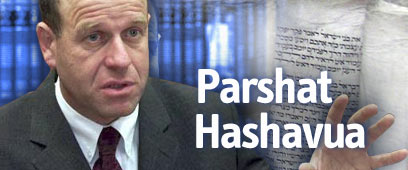
And with whom, exactly, did he make this deal? Unlike a regular contract in which two sides agree in good faith to make every effort to fulfill the terms of the deal, here we are speaking about a special standing unknown in contract law: "Neither with you alone do I make this covenant and this oath, but also with he that is not here with us today" (Deut. 29:13).
Moses obliges all future generations, without their knowledge or agreement, to maintain the covenant with God.
What caused him to do this? How could he saddle future generations with such a heavy burden? Why couldn't he have made do with the covenants and promises made long before, starting with the forefathers and ending with Mount Sinai?
Was Moses really able to see the future, well enough to discern the will and fate of future generations that he could obligate them in future? Or was there something else?
It is the nature of contracts to have two parties. After all, one person hardly needs to sign an agreement with himself.
Contracts feature commitment, promises, maybe even sacrifice and taking responsibility. This necessarily requires two sides.
Most people read these beautiful verses as an attempt by Moses to accept the commandments on behalf of mankind, who he represents to the Creator.
But maybe this view is not enough. There is more than enough reason to believe that Moses, shortly before his death, is rushing to create one more covenant, to bind not human kind, but… God himself.
Despite his age, Moses' senses have not dulled, and he feels that God is becoming more distant from the world. He is moving from being a micro-God – attending to the smallest details, spending time in each garden, speaking with the residents, making sure clothes didn't wear out, accompanying them to court and caring enough about them to evict them from His land – to becoming more and more removed.
Moses feels the God of the future will be much less involved in the daily running of the world. Perhaps He's tired, or perhaps something else is drawing His attention away from the world He created.
In either event, in order to prevent God from disappearing from peoples’ lives altogether, Moses signs Him to an everlasting covenant, with no possibility of renegotiation.
At the end of this week's reading, Moses establishes a system. He also established a mechanism by which scholars throughout the generations remove God completely from religion, Jewish law, and daily life.
"This commandment that I command you today… is not to be found in heaven, so you can say, 'who can take us up to heaven and get it (the Torah) for us" (Deut: 30:11).
God's opinion, majority opinion
Many years later, during the discussions of the Talmud, there is a fascinating discussion between Rabbi Eliezer and the other sages that cuts straight to the heart of our issue.
As the rabbis discuss issues of ritual purity, Rabbi Eliezer faces a majority of colleagues opposed to his understanding of Jewish law. Undeterred, the rabbi turns miracle worker to prove his point, saying, "If the law should be as I understand, let this carob tree prove it!"
And wonder of wonder, a miracle occurs: The tree arises, and moves a hundred feet.
Afterwards, the same Eliezer turns to God Himself to support his position and prove the justice of his arguments. And the Talmud records a Heavenly voice rang out, instructing the sages to rule in accordance with Rabbi Eliezer.
But despite the drama, and despite the clearly stated opinion of the Almighty, who has, at the end of the day, supported a minority opinion, they are faced by Rabbi Yehoshua, who declares in response: "The Torah is not in heaven, and we don't rule in accordance with heavenly voices!"
The only guiding principle we have is to rule like the majority. And God?
The parable teaches us that God stayed in heaven, smiled contentedly to Himself that His disciple had himself become a master: "You have bested Me, my child, you have bested Me."
The educational lessons to be learned from this parable are critical: God has no role in religious process, Jewish law, or in our daily lives. These are for us.
God's place is in heaven, and ours is here on Earth. Each of these parties to the contract has his own role. At once, Moses intended to oblige God to continue to play a daily role in the goings-on of this world, but at the same time set strict limits and forced Him to remain "shacked up" in heaven, opening up this world to the kingship of man.
Earth is ours, our decisions are ours, and the mistakes are ours.
And today? Are there any rabbis such as the great Eliezer, able to invoke a heavenly voice to support his positions, or like Rabbi Yeoshua, who was undeterred by miracles and wonders, and ruled according to human logic and a majority vote against his peers?















